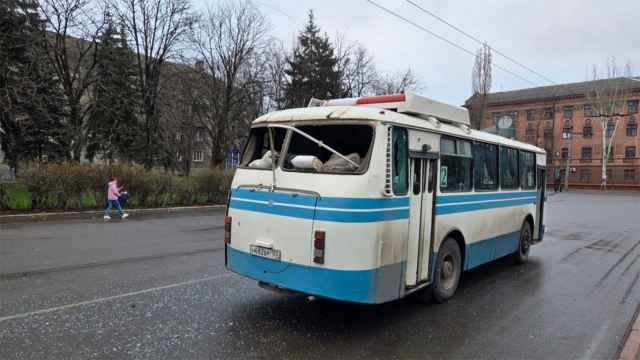President Dmitry Medvedev announced on Thursday the creation of an independent investigative superagency that will rip the powerful Investigative Committee out of the Prosecutor General’s Office.
Medvedev also gave the Interior Ministry two weeks to draft amendments to a proposed police law that take public criticism into account. Critics, however, said the planned amendments did little to resolve the reform’s serious flaws.
The new investigative body, which Medvedev called the “investigative committee of the Russian Federation,” will be based on the existing Investigative Committee and answer directly to the president, he said, adding that amendments needed to the current legislation would soon be submitted to the State Duma.
Medvedev suggested that investigative departments in various government agencies might one day also be included in the new body.
“Investigative bodies within other federal agencies, including in the Interior Ministry, will remain independent for now,” Medvedev said at a government meeting at his Gorky residence outside Moscow.
“Later on, other decisions can be made, including concentrating the investigation of all cases in the investigative committee,” he said, according to a transcript on the Kremlin’s web site.
The Investigative Committee, headed by Alexander Bastrykin, a close ally of Prime Minister Vladimir Putin, has been fighting for independence from the Prosecutor General’s Office almost since its inception three years ago. Formally, it is part of the prosecutor’s office and Bastrykin is a deputy prosecutor general.
Under the law, the Prosecutor General’s Office answers directly to Medvedev.
Mikhail Grishankov, deputy head of the State Duma’s Security Committee, said Medvedev’s reform aimed to introduce more independence into investigations but it would only prove successful if an entire new team of investigators were hired.
“I am afraid to use the word ‘purges,’ but the renewal of rank-and-file officials will be critical. Otherwise, everything will remain as it is,” Grishankov, a United Russia member, said by telephone.
He praised the decision to place the new investigative agency directly under the popularly elected president.
This measure will make it easier to investigate crimes committed or covered up by senior prosecutors, said Valentin Kovalyov, a former justice minister. “The measure will raise the level of investigations,” he said by phone.
As a deputy prosecutor general, the head of the Investigative Committee currently is nominated by the president but needs to be approved by the Federation Council.
Attempts to create a single, separate investigative agency analogous to the U.S. FBI date back to the early 2000s but have been met by repeated delays. The main argument for proponents of the reform is to separate investigators from prosecutors, who both oversee investigations and represent the state in court.
Also Thursday, Medvedev ordered his administration and the Interior Ministry to draw up proposals to amend draft police legislation that was posted online over the summer for public feedback. Medvedev asked for a clause to be added to the bill that requires arresting officers to read suspects their rights.
“This practice seems from all appearances to be a formality that adds nothing, but in the end it creates quite a sensible legal effect,” Medvedev said.
He said detainees should also have the right to make a phone call.
He ordered the Interior Ministry to develop a procedure that keeps people up to date on how the police are handling their complaints.
Medvedev said a much-criticized article in the police legislation that gives officers free access to private apartments should be supplemented with a clause defining this procedure.
Police officers should also wear badges identifying themselves and the units where they serve, Medvedev said, adding that this was normal practice elsewhere in the world.
He gave the Interior Ministry two weeks to submit the amendments to his administration.
The proposed changes, critics said, only touch on minor problems and fail to address major shortcomings.
Late last year, when Medvedev set the police reform in motion, he publicly and repeatedly insisted that its priority would be to strip the police force of “unnatural” functions like conducting investigations into businesses and running drunk tanks. He said police also should no longer register people’s complaints because they can easily manipulate statistics to demonstrate good performance.
Of these ambitious demands, the Interior Ministry has agreed only to give control of drunk tanks to the Health and Social Development Ministry.
New clauses in the police bill that vaguely define the police’s duties and responsibilities, it turned out, only expanded the authority of police officers and further boosted their propensities for corruption, human rights groups and other critics say. The new clauses include not only the right to enter any premises, but also to seize any documents from a person or legal entity and to continue offering guard services on the open market while at the same time increasing the Interior Ministry’s control over private security firms.
More than 16,000 people took part in discussing the draft of the bill, offering more then 40,000 comments — most of them critical. Many commentators lamented the fact that the Interior Ministry had been tasked with drafting the bill.
Medvedev on Thursday praised the public discussion, which he called “interesting and positive,” and said it should be used to test other bills.
“No one should be confused that 99 percent of the responses were critical. What else should we expect?” he said, adding that the final police bill should include all suggested changes.
Medvedev’s remarks appear to present a crucial test for the Interior Ministry’s preparedness for change since the ministry only tried to increase its powers with the initial draft, said Boris Kalachyov, a former police colonel and an adviser to the Duma’s Security Committee. He said that if public opinion was not taken into the account this time, no one would take the police reform seriously.
A Message from The Moscow Times:
Dear readers,
We are facing unprecedented challenges. Russia's Prosecutor General's Office has designated The Moscow Times as an "undesirable" organization, criminalizing our work and putting our staff at risk of prosecution. This follows our earlier unjust labeling as a "foreign agent."
These actions are direct attempts to silence independent journalism in Russia. The authorities claim our work "discredits the decisions of the Russian leadership." We see things differently: we strive to provide accurate, unbiased reporting on Russia.
We, the journalists of The Moscow Times, refuse to be silenced. But to continue our work, we need your help.
Your support, no matter how small, makes a world of difference. If you can, please support us monthly starting from just $2. It's quick to set up, and every contribution makes a significant impact.
By supporting The Moscow Times, you're defending open, independent journalism in the face of repression. Thank you for standing with us.
Remind me later.






